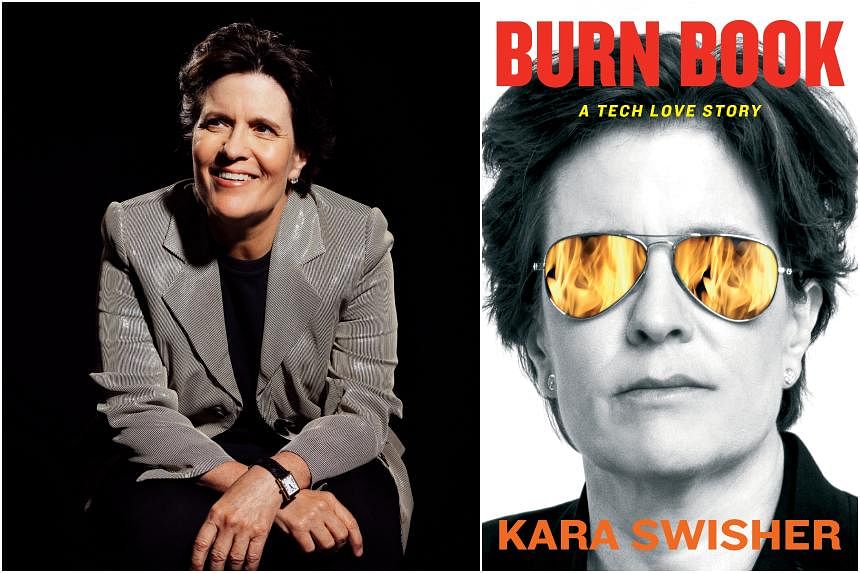Burn Book: A Tech Love Story
By Kara Swisher
Non-fiction/Piatkus/Paperback/297 pages/$33.84/Amazon SG (amzn.to/3IKzVAQ)
2 stars
Unfortunately, there is not much in pioneer Internet journalist Kara Swisher’s supposed tell-all that is revelatory.
Big tech is dominated by white, wealthy men divorced from reality, eager to “move fast and break things”. Check.
Governments have been too slow to regulate because they have for so long underestimated new media – surely, at this point a pedestrian conclusion.
Artificial intelligence is the next frontier and it “will eventually plough over us like a highway construction machine rolling over an anthill”. This is a warning so belated it has become mainstream, with OpenAI chief executive officer Sam Altman removed and then reinstated again in 2023 for this reason.
For someone with Swisher’s access – on, or used to be on, texting terms with honchos like Elon Musk and Mark Zuckerberg – Burn Book is a victim of its own promise.
Swisher, once an influential voice in the industry, presents persuasive, but by-now obvious arguments. Still believing that, at 61, she is as much a maverick as she was when she was younger, she betrays an ignorance of the shift in zeitgeist that has occurred around the last five years.
No longer one of rose-tinted enthusiasm, even the most casual observer’s default habitus is now sober cynicism. The trailblazing Swisher is late to her own party. One wishes she could have published this 10 years ago, before the Cambridge Analytica scandal and before the United States tech hearings.
TikTok barely gets a mention, and she offers barely any specifics for change except to call on tech leaders to do better, an especially underwhelming conclusion for a final chapter titled “Come With Me If You Want To Live”.
To be fair, Swisher once occupied a truly fringe position of loving the Internet.
In 1994, when most of her colleagues at The Washington Post were vying to cover the more careerist political track, her prescience led her to choose to cover modems and servers full-time, after downloading a Calvin & Hobbes cartoon collection and instinctively understanding that “everything that can be digitised will be digitised”.
Less interested in the nuts and bolts of computers than the upstart princes of Silicon Valley, she uprooted her life to San Francisco, penning a weekly column called Boom Town for The Wall Street Journal. She also co-founded the influential All Things Digital conference, which achieved the historic feat of getting Bill Gates and Steve Jobs to sit together for a joint interview.
Her extensive contacts meant her scoops came fast and frequently, published on a daily blog called AllThingsD.com. Former chief operating officer of Facebook Sheryl Sandberg says people would joke “I hope Kara never sees this” when they wrote memos, and more than one executive learnt that they were getting hired or fired from her reports.
But the focus of Burn Book is stubbornly not on her journalistic prowess. Rather, for marketability, she has focused more on her interactions – often superficial – with the larger-than-life founders of Google, YouTube, Facebook, Amazon, Uber and other by-now toxically familiar platform names.
She is on a first-name basis with them, but ultimately not that close – or if she is, there is a lot more she is not letting on. No stories she relates are nearly salacious enough to warrant wading through the dry and mostly straightforward relating of big tech’s nascent history.
Among supposedly big reveals: Zuckerberg, in his live interview with Swisher, was publicly “melting”, and at her suggestion, removed his hoodie on stage to calm down. Musk once texted her “You’re an a**hole” for Musk reasons. An Uber investor had a live reindeer greet guests in his front yard – a chance for Swisher to note that it was female and gesture at the industry’s rampant sexism.
The tales are too tame to shock, especially when one knows there must be so much more indecent, childish behaviour, given daily voice by Musk on X (formerly Twitter). There is, though, an excellent comparison of the differing dispositions of the suave Jobs and the more socially inept Gates.
“If both died on the same day, one observer told me, Gates’ obituary would begin by noting that he was ‘the world’s richest man’ while Jobs’ would begin with the words ‘tech’s greatest visionary’,” she writes. The machinations to get the frenemies on stage at her conference, and a snide jibe Jobs made at Gates right before that – these threatened to derail the process pass for the most interesting behind-the-scenes element of the book.
Perhaps ironically, it is the early days of Swisher as a journalist (before she turned “reportrepreneur”), bristling against unsympathetic and obnoxious editors, that feel the most alive.
A combative and decidedly undiplomatic character, she had no qualms about telling former publisher of The Washington Post Don Graham that old media would be wiped out and regretting that she had not told her boss John McLaughlin that she wished he were dead before he soon keeled over.
Swisher takes the chance to settle a few other cheap scores, but there is a lot of cantankerous talk with no insight. Her actual reporting work may have had the first mover advantage, but Burn Book is a casualty of the 24/7 digital news cycle that she is so proud of, rendered obsolete before it hits the presses.
If you like this, read: The Times: How The Newspaper Of Record Survived Scandal, Scorn, And The Transformation Of Journalism by Adam Nagourney (Crown, 2023, $51.78, Amazon SG, go to amzn.to/4aokUjT). The story of The New York Times, told from 300 interviews and years of archival research by a veteran political reporter.


